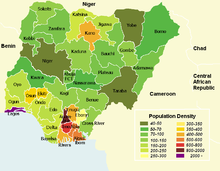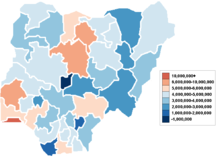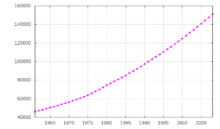- Demographics of Nigeria
-
This article is about the demographic features of the population of Nigeria, including population density, ethnicity, education level, health of the populace, economic status, religious affiliations and other aspects of the population.
The most populous country in Africa, Nigeria accounts for approximately one-sixth of Africa's people. Approximately 50% of Nigerians are urban dwellers. At least 24 cities have populations of more than 100,000. The variety of customs, languages, and traditions among Nigeria's 389 ethnic groups gives the country a cultural diversity.
Census figures are used to determine regional funding and representation of ethnic and religious groups in government service. This provides an incentive for inflating local populations. On the other hand, some academics believe the figures given below by the Food and Agriculture Organisation (FAO) are a serious under-estimate.
Professor JG Ottong, a social scientist at the University of Calabar, explained that population has been a sensitive and controversial issue "because of its implications for shaping regional, state and ethnic relations and balance of power". In the past, census figures were believed to have been manipulated for political advantage.[1]
Contents
Overview
The most numerous ethnic group in the northern two-thirds of the country is the Hausa-Fulani,the overwhelming majority of whom are Muslim. Other major ethnic groups of the north are the Nupe, Tiv, and Kanuri. The Yoruba people are the most numerous in the southwest. Over half of the Yorubas are Christian and about a quarter are Muslim, with the remainder hold traditional Yoruba views. The predominantly Christian Igbo are the largest ethnic group in the southeast. Roman Catholics are the largest denomination, but Pentecostal and other Evangelical denominations are also strong. The Efik, Ibibio, Annang, and Ijaw (the country's fourth-largest ethnic group) communities also comprise a substantial segment of the population in that area. Persons of different language backgrounds most commonly communicate in English, although knowledge of two or more Nigerian languages is widespread. Hausa, Yoruba, and Igbo are the most widely used Nigerian languages.
CIA World Factbook demographic statistics
The following demographic statistics are from the CIA World Factbook, unless otherwise indicated.
Population and Population Projections
Population: 155,215,573 (July 2011 est.)
Nigeria has been experiencing a population explosion for at least the last 50 years due to very high fertility rates, quadrupling its population during this time.
According to the United Nations, the population of Nigeria will reach 390 million by 2050. In 2100, the population of Nigeria will reach 730 million.[2]
According to the United States Census Bureau, the population of Nigeria will reach 402 million by 2050. Nigeria will then be the 4th most populous country in the world.[3]
Age structure
0–14 years: 44% (male 27,181,020; female 26,872,317)
15–64 years: 53% (male 33,495,794; female 32,337,193)
65 years and over: 3% (male 1,729,149; female 1,722,349) (2000 est.)0–14 years: 41.5% (male 31,624,050/female 30,242,637)
15–64 years: 55.5% (male 42,240,641/female 40,566,672)
65 years and over: 3.1% (male 2,211,840/female 2,343,250) (2010 est.)0-14 years: 40.9% (male 32,476,681/female 31,064,539)
15-64 years: 55.9% (male 44,296,228/female 42,534,542)
65 years and over: 3.1% (male 2,341,228/female 2,502,355) (2011 est.)Vital statistics
- Population growth rate
- 1.935% (2011 est.)
- Median age
- total: 19 years
- male: 18.9 years
- female: 19.1 years (2009 est.)
- Birth rate
- 43 births/1,000 population (2008 est.)
- 36.65 births/1,000 population (2009 est.)
- 35.51 births/1,000 population (2011 est.)
- Death rate
- 18 deaths/1,000 population (2008 est.)
- 16.56 deaths/1,000 population (July 2009 est.)
- 16.06 deaths/1,000 population (July 2011 est.)
- Net migration rate
- 0.28 migrant(s)/1,000 population (2000 est.)
- -0.1 migrant(s)/1,000 population (2009 est.)
- Sex ratio
- at birth: 1.06 male(s)/female
- under 15 years: 1.05 male(s)/female
- 15–64 years: 1.04 male(s)/female
- 65 years and over: 0.94 male(s)/female
- total population: 1.04 male(s)/female (2009 est.)
- Infant mortality rate
- 94.35 deaths/1,000 live births (2010 est.)
- Life expectancy at birth
- total population: 51.56 years
- male: 51.58 years
- female: 51.55 years (2000 est.)
- total population: 46.94 years
- male: 46.16 years
- female: 47.76 years (2009 est.)
- Total fertility rate
- 4.73 children born/woman (2011 est.)
- HIV/AIDS - adult prevalence rate
- 3.1% (2007 est.)
- HIV/AIDS - people living with HIV/AIDS
- 2.6 million (2007 est.)
- HIV/AIDS - deaths
- 170,000 (2007 est.)
Ethnic groups
Nigeria, which is Africa's most populous country, is composed of more than 250 ethnic groups; the following are the most populous and politically influential: Hausa and Fulani 29%[4], Yoruba 21%[4], Igbo 18%[4], Ijaw 6.5%[citation needed], Yakurr 4%[citation needed], Ibibio 4.5%[citation needed], Kanuri 4%[4], Annang 3.5%[citation needed], Etsakor 2.2%[citation needed], Tiv 2.5%[4], Efik 2%[citation needed]. These percentages are estimates, based on the number of settlements, including the number of towns, villages, hamlets and cities, with information supplied by the Nigeria postal service[citation needed]. Although, these estimates have come under opposition by those who believe the ethnic group population counts have been tampered with for ethnic numerical superiority.[5][6][7]
In the absence of an up to date census, other population figures do not follow scientific procedures. Only these are backed by settlement figures provided by the government.
Languages
English (official), Hausa, Yoruba, Igbo, Fulani, Efik (Annang/Ibibio/Efik), Ijaw, Edo, Etsako, Esan, Benis and others.
Literacy
- Definition: Entire population of all ages who can read and write in any language
- Total population: 78.6%
- Male: 84.35%
- Female: 72.65% (all: National Bureau of Statistics, 2010 National Literacy Survey)[8]
Migration
Today millions of ethnic Nigerians live abroad, the largest communities can be found in the United Kingdom (200,000- 500,000)[9] and the United States (165,000 Nigerians). There are also large groups in Canada, Portugal and many other countries.[citation needed]
- Nigerian in Britain
- Nigerian in America
- Nigerian in Canada
Religions
Based on a 2009 World Religious survey (Mapping out the Global Muslim Population) 50.4% of Nigeria's population were Muslims,[10] they are mainly found in the northern part of the country. Majority of Nigerian Muslims are Sunni. Christians are the second largest religious group making up 48.2% of the population, they dominate in the Middle Belt and southern part of the country, while adherents of other religions make up 1.4% of the population.[11]
References
- ^ Odunfa, Sola (2006-03-21). "Nigeria's counting controversy". bbc.co.uk (BBC News, 14 December 2005). http://news.bbc.co.uk/2/hi/africa/4512240.stm. Retrieved 2006-02-19.
- ^ World Population Prospects: The 2010 Revision Population Database
- ^ US Census Bureau, Demographic Internet Staff. "International Data Base (IDB) - Country Rankings". Census.gov. http://www.census.gov/ipc/www/idb/ranks.php. Retrieved 2011-08-29.
- ^ a b c d e "Calculation from percentage and overall population count of Nigeria". People, Ethnic groups: CIA World fact book. https://www.cia.gov/library/publications/the-world-factbook/geos/ni.html. Retrieved 2009-11-24.
- ^ Onuah, Felix (29 December 2006). "Nigeria gives census result, avoids risky details". Reuters. http://www.alertnet.org/thenews/newsdesk/L29819278.htm. Retrieved 2008-11-23.
- ^ Lewis, Peter (2007). Growing Apart: Oil, Politics, and Economic Change in Indonesia and Nigeria. University of Michigan Press. p. 132. ISBN 0-472-06980-2. http://books.google.com/books?id=T4-rlVeb1n0C&pg=PA132. Retrieved 2008-11-23.
- ^ Suberu, Rotimi T. (2001). Federalism and Ethnic Conflict in Nigeria. US Institute of Peace Press. p. 154. ISBN 1-929-22328-5. http://books.google.com/books?id=WKeUMmDlPkEC&pg=PA154. Retrieved 2008-12-18.
- ^ "National literacy main report" (PDF). http://www.nigerianstat.gov.ng/uploads/latestRelease/de4f17834ea0c57a9e1f440d029aebaa460863d0.pdf. Retrieved 2011-08-29.
- ^ "Country Profile: Nigeria". Fco.gov.uk. 2010-06-25. http://www.fco.gov.uk/en/about-the-fco/country-profiles/sub-saharan-africa/nigeria?profile=intRelations&pg=4. Retrieved 2011-08-29.
- ^ "Mapping out the Global Muslim Population" (PDF). http://pewforum.org/newassets/images/reports/Muslimpopulation/Muslimpopulation.pdf. Retrieved 2011-08-29.
- ^ "Nigeria: Facts and figures". BBC News. 2007-04-17. http://news.bbc.co.uk/2/hi/africa/6508055.stm.
Ethnic groups in Nigeria Annang · Atyap · Aulliminden · Berom · Edo · Buduma · Defaka · Djerma · Ebira · Efik · Eket · Ekoi · Eleme · Esan · Etsakor · Fon · Fula · Goemai · Gwari · Hausa · Ibibio · Idoma · Igala · Igbo · Ijaw · Isoko · Itsekiri · Jukun · Kamuku · Kanuri · Kilba · Kirdi · Kofyar · Kuteb · Longuda · Mumuye · Nupe · Ogoni · Saro · Tarok · Tiv · Urhobo · Yoruba
Demographics of Africa Sovereign
states- Algeria
- Angola
- Benin
- Botswana
- Burkina Faso
- Burundi
- Cameroon
- Cape Verde
- Central African Republic
- Chad
- Comoros
- Democratic Republic of the Congo
- Republic of the Congo
- Côte d'Ivoire (Ivory Coast)
- Djibouti
- Egypt
- Equatorial Guinea
- Eritrea
- Ethiopia
- Gabon
- The Gambia
- Ghana
- Guinea
- Guinea-Bissau
- Kenya
- Lesotho
- Liberia
- Libya
- Madagascar
- Malawi
- Mali
- Mauritania
- Mauritius
- Morocco
- Mozambique
- Namibia
- Niger
- Nigeria
- Rwanda
- São Tomé and Príncipe
- Senegal
- Seychelles
- Sierra Leone
- Somalia
- South Africa
- South Sudan
- Sudan
- Swaziland
- Tanzania
- Togo
- Tunisia
- Uganda
- Zambia
- Zimbabwe
States with limited
recognition- Sahrawi Arab Democratic Republic
- Somaliland
Dependencies and
other territories- Canary Islands / Ceuta / Melilla / Plazas de soberanía (Spain)
- Madeira (Portugal)
- Mayotte / Réunion (France)
- Saint Helena / Ascension Island / Tristan da Cunha (United Kingdom)
- Western Sahara
Categories:
Wikimedia Foundation. 2010.



